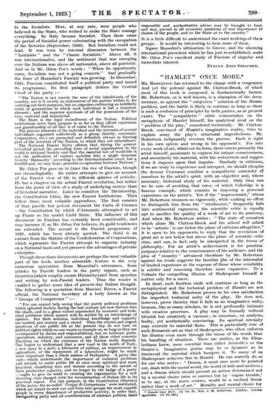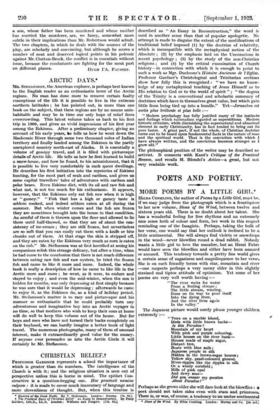" HAMLET " ONCE MORE.*
Ma. ROBERTSON has returned to the charge with a vengeance. And yet the polemic against Mr. Clutton-Brock, of which most of this book is composed, is fundamentally barren. Mr. Robertson, as is well known, is a champion of the docu. mentary, as against the " subjective " solution of the Handel problem, and the battle is likely to continue so long as there is such a confusion of principles by both parties, as at present exists. The " sympathetic " critic concentrates on the metaphysic of Hamlet himself, his analytical rival on the "problem of the play," considered technically. Mr. Clutton- Brock, convinced of Hamlet's imaginative reality, tries to explain away the play's structural imperfections. Mr. Robertson indignantly reverses the process. • Each is right in his own sphere and wrong in his opponent's. For into every work of art, whatever its form, there enters primarily the artist himself, passionate to express his unique consciousness, and secondarily his material, with the restrictions and sugges- tions it imposes upon that impulse. Similarly in criticism, if we are truly to experience and interpret, we should (despite the devout Croceans) combine a sympathetic surrender of ourselves to the artist's spirit, with an objective and, where necessary, historical study of his material. Only thus can we be sure of avoiding that error, of which Coleridge is a famous example, which consists in imposing a personal experience on the artist's. Yet if the "impressionist," whom Mr. Robertson trounces so vigorously, while making no effort to distinguish him from the "intuitionist," frequently falls into sentimental vagueness, the scientific critic is equally apt to sacrifice the quality of a work of art to its anatomy. And when Mr. Robertson writes : "The state of sensation which alone Mr. Clutton-Brock and his school will admit to be ' artistic ' is one below the plane of criticism altogether," it is open to his opponents to reply that the revelation of great art is not below but above the plane of scientific criti- cism, and can, in fact, only be interpreted in the terms of philosophy. For an artist's achievement is for practical
purposes relative to the consciousness of his audience, and the plea of " insanity " advanced elsewhere by Mr. Robertson against his rivals suggests the familiar jibe of the rationalist of limited experience at the expense of those whose sensibility is subtler and reasoning therefore more expansive. To a Voltaire the compelling illusion of Shakespeare himself is matter only for a sneer.
In short, such fruitless strife will continue so long as the metaphysical and the technical problem of Hamlet arc not distinguished. Mr. Robertson proves to his own satisfaction the imperfect technical unity of the play. He does not, however, prove thereby that it fails as an imaginative unity, because, like so many scholars, he is not profoundly intimate
with creative processes. A play may be formally without blemish but creatively a vacuum ; in structure, on analysis, faulty, yet aesthetically convincing. Its spiritual intensity may override its material flaws. This is particularly true of such Romantic art as that of Shakespeare, who often enforces his illusion even more through the tissue of his words than his handling of situation. There, are unities, as the Eliza- bethans knew, more essential than either Aristotle's or the theatre's. Imaginative genius may be so dynamic as to transcend the material which hampers it. To many of us
Shakespeare achieves this in Hamlet. He can scarcely do ad
for one who writes : "Drama, it must once more be pointed out, deals with the moral world, the world of wills and motives ; and a drama which should present an action determined not by a mental choice (wise or unwise) but by engine trouble,' so to say, at the nerve centres, would be a medical thesis rather than a work of art." Morality and mental choice for
• Howe Onco Mors. Hy the Rt. Hon, J. IL Robertson, London : Cobden Sanderson. [7a. 64, net.] a son, whose father has been murdered and whose mother has married the murderer, are, we fancy, somewhat more subtle in their implications than Mr. Robertson would admit. The two chapters, in which he deals with the sources of the play, are scholarly and convincing, but although he scores a number of neat and deserved logical points in his polemic against Mr. Clutton-Brock, the conflict is in essentials without issue, because the combatants are fighting for the most part



































 Previous page
Previous page